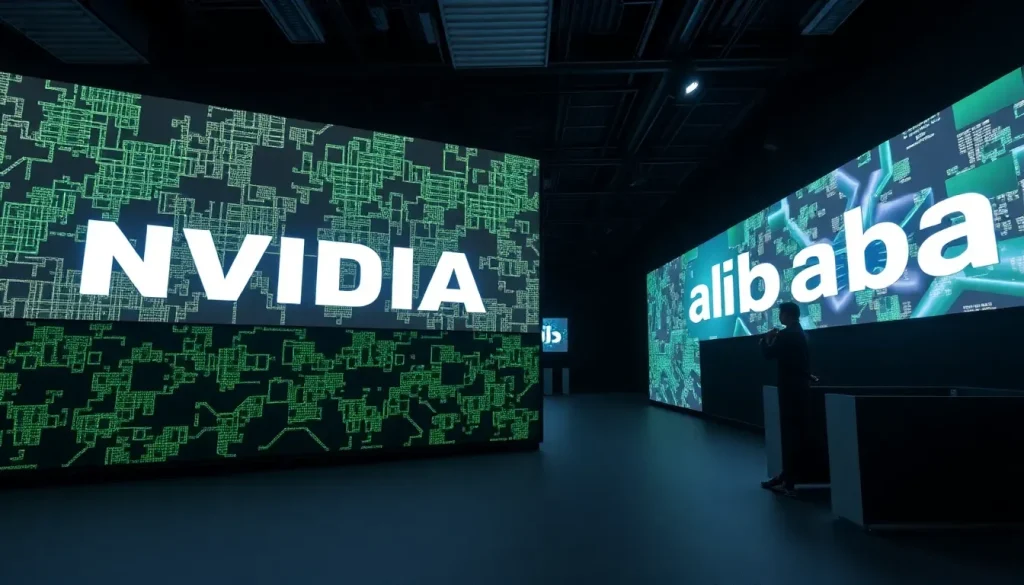NVIDIA and Alibaba sign AI infrastructure deal despite China restrictions

In the rapidly evolving landscape of artificial intelligence (AI), strategic collaborations are becoming crucial for companies aiming to enhance their technological capabilities and market presence. One of the most notable recent developments involves NVIDIA and Alibaba, two giants in their respective fields, who have signed an agreement to bolster AI infrastructure. This partnership is particularly significant given the current geopolitical climate and the restrictions imposed by the United States on technology exports to China.
This article delves into the implications of this partnership, the context in which it has emerged, and how it reflects the broader competitive landscape of AI development globally. As both companies seek to leverage their strengths, the impact of their collaboration could reshape the future of AI technology, not just in China but around the world.
- Alibaba and NVIDIA's strategic partnership amidst U.S. restrictions
- The implications of NVIDIA's hardware restrictions and Alibaba's strategic moves
- Alibaba's ambitious plans for global AI expansion
- Investment in AI infrastructure and global data centers
- Future outlook: The evolving landscape of AI technology
Alibaba and NVIDIA's strategic partnership amidst U.S. restrictions
NVIDIA's journey began with a focus on desktop graphics cards, primarily for gaming through its GeForce lineup, later expanding into professional-grade solutions with the Quadro series. Over time, as the AI sector burgeoned, NVIDIA recognized a lucrative opportunity in developing GPUs specifically tailored for AI inference and training. However, this shift has been complicated by the U.S. government's stringent export regulations aimed at limiting China's access to cutting-edge technology.
The recent partnership between NVIDIA and Alibaba is particularly striking given the backdrop of these restrictions. While NVIDIA has historically faced challenges in selling its high-performance AI GPUs in China, the agreement suggests a nuanced approach that focuses on integrating NVIDIA's AI software rather than hardware. Alibaba Cloud has indicated that the collaboration emphasizes enhancing its AI capabilities through software integration, potentially circumventing the limitations placed on hardware sales.
The implications of NVIDIA's hardware restrictions and Alibaba's strategic moves
Due to U.S. regulations, NVIDIA has had to develop scaled-back versions of its GPUs for the Chinese market, which have also encountered legal challenges. As a result, companies in China have resorted to third-party nations to acquire these technologies. This landscape raises questions about how Alibaba's agreement with NVIDIA will navigate these restrictions effectively.
- Focus on software integration rather than hardware acquisition
- Leveraging Alibaba's cloud infrastructure to enhance AI capabilities
- Potentially avoiding legal ramifications associated with hardware sales
Despite the challenges, the partnership signals that both companies are keen to advance AI technology in China, a market that is increasingly vital for global tech development. Alibaba's CEO, Eddie Wu, has emphasized the need for this collaboration to keep pace with the rapid advancements in AI technology, highlighting an industry that has surpassed their initial expectations.
Alibaba's ambitious plans for global AI expansion
Recently, Alibaba Cloud unveiled its latest AI models, Qwen3-Omni and Qwen3-Max, showcasing its commitment to pushing the boundaries of AI technology. These models represent a significant step forward, with the Qwen3-Omni being an omnimodal AI and Qwen3-Max designed to compete with leading industry standards.
Interestingly, Alibaba has developed chips capable of competing with NVIDIA's H20, a response to the constraints surrounding NVIDIA's hardware. This move indicates that Alibaba is not entirely reliant on NVIDIA for its technological advancements and is prepared to forge its path in the AI landscape.
Investment in AI infrastructure and global data centers
In a bold move to solidify its presence in the global market, Alibaba has announced plans to invest approximately $53 billion in enhancing its AI infrastructure. This investment will facilitate the establishment of additional data centers in strategic locations such as Mexico, Japan, and Dubai. These centers are crucial for supporting the burgeoning demand for AI services and ensuring that Alibaba remains a competitive player on the international stage.
- Investment of $53 billion in AI infrastructure
- Creating data centers in Mexico, Japan, and Dubai
- Aiming for a greater international presence
As AI continues to be a focal point for global technological advancement, Alibaba's expansion plans suggest a proactive approach to navigating the complexities of international regulations and market demands. By establishing a robust infrastructure, Alibaba aims to become a leading player in the AI sector, not only in China but also globally.
Future outlook: The evolving landscape of AI technology
The collaboration between NVIDIA and Alibaba could have far-reaching implications for the future of AI technology. As both companies work to enhance their offerings, the competition in the AI sector is expected to intensify, with other players likely to respond to this partnership.
Moreover, the geopolitical tensions surrounding technology exports will continue to shape the strategies of tech companies globally. The success of Alibaba's investment in AI infrastructure and the integration of NVIDIA's software capabilities will serve as a bellwether for how companies can navigate these challenges while still driving innovation.
For those interested in a broader context of these developments and their implications, a relevant video is available for further insights:
In conclusion, the partnership between NVIDIA and Alibaba illustrates the intricate dance of technology, regulation, and market dynamics. As these companies strive to enhance their capabilities and expand their global reach, the developments in AI technology will undoubtedly be a focal point of interest for stakeholders across the globe.




Leave a Reply